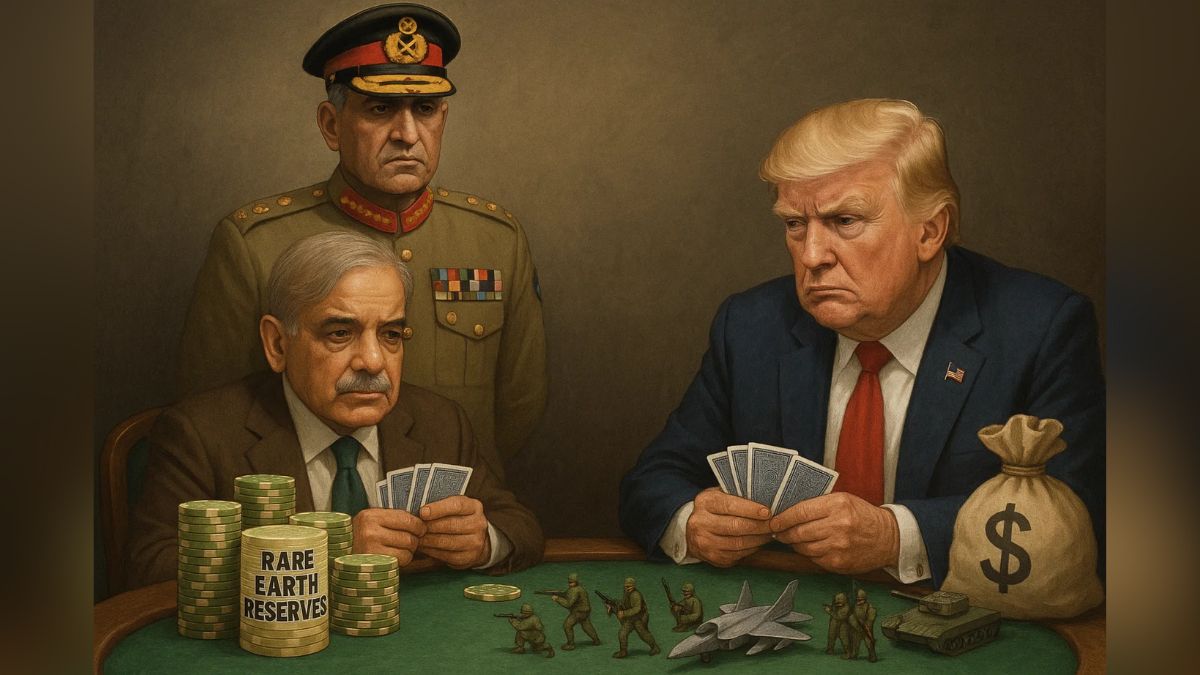Pakistan Pitches Rare Earth Reserves To Trump, Positions Minerals As Strategic Bargaining Chip

Pakistan is using its rare earth minseral reserves as a bargaining chip with US President Donald Trump. Image courtesy: AI-generated picture via Sora
Pakistan has moved to leverage its rare earth reserves as a strategic bargaining tool with the United States (US), with Army Chief Field Marshal Asim Munir personally presenting samples of “rare earth precious metals and stones” to former US President Donald Trump during a meeting at the White House on September 25, 2025. Prime Minister Shehbaz Sharif was also present at the high-profile engagement.
CNN-News18, citing intelligence inputs, reported that Munir briefed Trump on Pakistan’s untapped potential in rare earths and critical minerals— resources that are vital for US defence production, electric vehicle (EV) manufacturing, and the global semiconductor industry.
Trump, who hailed both Sharif and Munir as “great leaders,” is understood to have expressed a strong interest in exploring Pakistan’s mineral wealth, which various assessments estimate to be worth around six trillion dollars.
Why are Rare Earths strategic assets?
The White House meeting came shortly after Pakistan signed a $500 million memorandum of understanding (MoU) with American metals firm US Strategic Metals (USSM).
Sources said Trump’s warm handshake with Sharif was described as a “strategic handshake,” signaling a potential shift toward a deeper economic and security partnership between Washington and Islamabad.
Officials familiar with the talks said Munir’s dramatic presentation of rare earth samples was intended to appeal directly to Trump’s deal-making instincts.
By showcasing tangible assets instead of limiting discussions to abstract diplomacy, Pakistan’s military leadership aimed to highlight its ability to provide the United States with something beyond its traditional security role in South Asia.
What’s the geopolitical significance?
The move carries strong geopolitical undertones. With Pakistan’s fragile economy under pressure from the International Monetary Fund (IMF) and China already dominant in its mining sector, particularly in Balochistan’s Saindak and Reko Diq projects, Munir’s outreach to Trump signals Islamabad’s intent to diversify its strategic partnerships.
Intelligence assessments suggest the gesture was also meant to reassure Washington that investor protection would be guaranteed under army oversight. At the same time, it served as a broader message to Gulf states and rival India that Pakistan seeks to position itself as a key player in the global supply chain for critical minerals.
What’s the national security framing?
Analysts note that Munir’s direct involvement underlines how Pakistan is treating rare earth resources not merely as an economic opportunity but as a national security asset.
By aligning critical minerals with strategic diplomacy, Pakistan is attempting to elevate its role in an increasingly resource-driven global order, where access to rare earths has become a new frontier in geopolitical competition.







